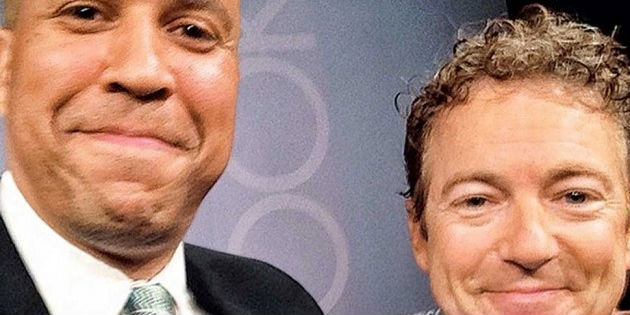If anything good has come out of Ferguson, it might be the emerging left-right coalition against police militarization in America.
Videos by Rare
But what should we do next to build on this cooperation?
Well, if you are one writer for The New Republic, the answer is to change the subject to something that has divided the left and right for decades: gun control.
That would be Alec MacGillis, author of a piece entitled “Libertarians who oppose a militarized police should support gun control. But they don’t, of course.”
Of course, a libertarian could just as easily write an article headlined: “Liberals who oppose a militarized police should want fewer laws. But they don’t, of course.”
In a sense, this is nothing new. Last year, Tom Watson warned liberals against forming a coalition with libertarians against warrantless NSA surveillance because of disagreements on other issues. He wouldn’t even support an event at which some liberals and progressives were going to speak alongside libertarians on this single issue (his subhead: “Ideologues co-opt an anti-NSA rally”).
“It is fatally compromised by the prominent leadership and participation of the Libertarian Party and other libertarian student groups; their hardcore ideology stands in direct opposition to almost everything I believe in as a social democrat,” Watson wrote melodramatically (his venue was Salon, after all).
The Libertarian Party, he added, even opposes all gun control laws!
Accusing libertarians of “co-opting” opposition to the NSA is like saying Catholics hijacked the pro-life movement or women co-opted feminism. Libertarians took the lead on this issue, just as they have on police militarization.
The actual legislative coalition seeking to rein in the NSA is comprised of Tea Party conservatives and liberal progressives fighting against the moderates in both parties. Libertarian-leaning Republicans like Justin Amash brought them together.
This is exactly how things have played out on drones, last year’s proposed war in Syria, and now the militarization of local law enforcement. To not accept the help of libertarians and libertarian-tinged conservatives on these issues or to prefer to emphasize other disagreements instead is to accept political defeat on these issues for the foreseeable future.
Your garden-variety liberal may be more likely to oppose wars, support drug legalization, protect civil liberties and care about police militarization than your run-of-the mill conservative. But with the partial exception of war, such liberals are seldom allowed near the center of power in the Democratic Party.
Plenty of mainstream Democrats—including Hillary Clinton, the current frontrunner for the 2016 Democratic presidential nomination—believe the above views are a liability for their party and advocate being tougher than Republicans. Even the Obama administration has sometimes needed a nudge from libertarians in the other party.
Libertarians and liberty conservatives have played an outsized role in bringing these issues to the forefront. And by moving a critical mass of the Republican Party in the antiwar, pro-decriminalization, civil libertarian, anti-militarization direction, they have made it safer for liberal Democrats to do the same.
Back to gun control. A variant of MacGillis’ argument has been made by some conservatives who don’t have a problem with police militarization: libertarians oppose fear-mongering about assault weapons when it comes to gun control; why don’t they do the same when it comes to arming local cops?
Gun rights, even with the Second Amendment’s oft-misunderstood reference to militias, have always rested on the idea that there is an important difference between guns in private and public hands. When MacGillis writes about the rarity of police shootings in Britain, he fails to note that the police themselves are far less likely to armed, not just citizens.
Unlike Watson, however, MacGillis to his credit quotes two libertarians who question his thesis. Dave Kopel points out that there was little gun control in the 1960s, when police were not militarize, while militarization has increased since the enactment of major gun control measures in the 1990s.
The libertarian journalist Radley Balko—who has done more to point out the problems of police militarization than virtually any liberal—expressed skepticism of “the idea that government is abusing its power and authority and thereby we should put more restrictions on what citizens should have.”
New gun control laws won’t change the fact that America is a heavily armed society. That may require confiscation—something that would require violations of the Fourth Amendment that should concern liberal civil libertarians as well as violations of the Second Amendment.
Few people are objecting to the police having the firepower necessary to counteract the most dangerous and well-armed criminals. What most of us oppose is the militarization of routine contacts between police and the general public.
The suburban northern Virginia town I live in is not plagued by machine gun-wielding gangs. The police nevertheless use SWAT teams to execute warrants in nonviolent situations. In 2006, such a tactical unit killed a local optometrist named Salvatore J. Culosi Jr. when an officer’s gun accidentally discharged. Culosi was unarmed and suspected of being a sports bookie.
Many communities have militarized local law enforcement because of the availability of federal funds and the federal war on drugs. Neither has much to do with gun control.
Liberals and libertarians can agree to disagree on gun control while continuing to work together on police militarization.



